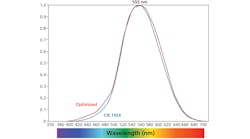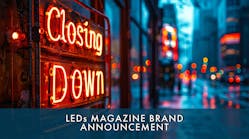New report: Light near bedtime has little effect on sleep
Contrary to what many people believe, LED lighting from nighttime gadgets and TV screens might have little-to-no negative effect on sleep, according to a team of academics, clinicians, and sleep analysts from the commercial world.
Writing in the journal Sleep Medicine Reviews on Elsevier's ScienceDirect website, the authors state that the effect of bright screen light and other factors that are typically implicated in sleep disturbances is “small-to-negligible.”
While bright light does indeed seem to cause alertness, that alertness does little to impede the onset of sleep, delaying it only by a maximum of 9.9 minutes, they wrote in a debunking paper that might as well have been called “You can have your cake and eat it, too.” The actual title is “A bidirectional model of sleep and technology use: A theoretical review of how much, for whom, and which mechanisms”.
The six authors included Michael Gradisar, who is both the CEO of Adelaide, Australia sleep treatment center WINK Sleep Pty Ltd and the head of sleep science for Gothenburg, Sweden–based Sleep Cycle AB, a sleep app vendor.*
They described their paper as “an updated theoretical review” in which which they examined other scientists’ studies over the last decade that, taken as a whole, refute prevailing notions that bright and blue-enriched LED light at night harms sleep.
The authors might count themselves among those who have changed their views.
“Together, we are now presented with data that challenge our original notion that evening technology use always causes an effect on sleep,” they wrote.
While many scientists maintain that the blue-enriched light of LED screens disrupts sleep, Gradisar and his colleagues are not the first to publicly question the link. University of Oxford circadian science pioneer Russell Foster, although not a disbeliever, told LEDs Magazine two years ago that the many details and nuances still have to be worked out.
The new Sleep Medicine Reviews paper looks not only at the effect of light on sleep and alertness, but also at other factors such as the stimulating effect of technology engagement itself around bedtime, and at the type of content involved.
It also examines the subject from the flip side, looking at the relationship of pre-existing sleep disorders to technology, and how technology helps, hinders, or otherwise interacts with those disorders.
But in calling for a rethink of late-night light’s effect on sleep, the paper will resonate with anyone who has ever fallen fast asleep minutes into watching TV or looking at their smartphone screen.
—
* In addition to Dr. Gradisar, the five other authors include two who are WINK staff members: Kate Bartel and Chelsea Reynolds. Bartel is also affiliated with Riverland Academy of Clinical Excellence, Riverland Mallee Coorong Local Health Network and with Flinders University, College of Medicine and Public Health, both in Australia. Reynolds is affiliated with Flinders University, College of Education, Psychology and Social Work, as are two other co-authors, Meg Pillion and Serena Bauducco. Bauducco also works at Örebro University, School of Behavioural, Social and Legal Sciences, Sweden. Rounding out the co-authors is Michal Kahn of Tel Aviv University, School of Psychological Sciences, Israel. The paper was supported by the Swedish Research Council, a Swedish government agency for funding scientific research.
Follow our LinkedIn page for our latest news updates, contributed articles, and commentary, and our Facebook page for events announcements and more. You can also find us on the X platform.

Mark Halper | Contributing Editor, LEDs Magazine, and Business/Energy/Technology Journalist
Mark Halper is a freelance business, technology, and science journalist who covers everything from media moguls to subatomic particles. Halper has written from locations around the world for TIME Magazine, Fortune, Forbes, the New York Times, the Financial Times, the Guardian, CBS, Wired, and many others. A US citizen living in Britain, he cut his journalism teeth cutting and pasting copy for an English-language daily newspaper in Mexico City. Halper has a BA in history from Cornell University.








![The DesignLights Consortium continues to make progress in shifting outdoor lighting products and implementation practices toward a more restrained and thoughtful strategy. [Image does not represent a DLC qualified fixture.] The DesignLights Consortium continues to make progress in shifting outdoor lighting products and implementation practices toward a more restrained and thoughtful strategy. [Image does not represent a DLC qualified fixture.]](https://img.ledsmagazine.com/files/base/ebm/leds/image/2024/08/66be810888ae93f656446f61-dreamstime_m_265700653.png?auto=format,compress&fit=&q=45&h=139&height=139&w=250&width=250)
